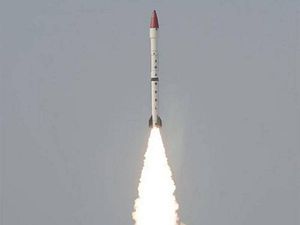China has acknowledged that it sold Pakistan a tracking system for use in developing new ballistic missiles capable of delivering multiple nuclear warheads, according to a report published last week in the South China Morning Post. Chinese government authorities decided to declassify information on a Sino-Pakistani deal last week; a statement posted on the website of the Chinese Academy of Sciences (CAS) acknowledged the sale and said that China was the first country to transfer this kind of equipment to Pakistan.
The equipment in question is reportedly a sophisticated optical tracking and measurement system, meant to allow Pakistani engineers to better observe flight tests and retrieve useful data. According to the South China Morning Post, the system sold is thought to comprise “a pair of high-performance telescopes equipped with a laser ranger, high-speed camera, infrared detector and a centralized computer system that automatically captures and follows moving targets.”
The Chinese system sold to Pakistan reportedly includes four telescope units, allowing end-users to simultaneously surveil the performance of multiple warheads. The rationale for this transfer is presumably Pakistan’s ongoing work on its Ababeel medium-range ballistic missile, the first Pakistani missile to boast a multiple independently targetable reentry vehicle (MIRV) capability. Pakistan first tested the missile last January, which the U.S. Defense Intelligence Agency confirmed successfully demonstrated “South Asia’s first MIRV payload.”
The Chinese declassification of the sale comes after an unusually busy period of developmental and operational Indian ballistic missile tests, including the fifth flight test of the canisterized, solid-fuel Agni-V intercontinental-range ballistic missile in January 2018. Following that test, in February. China conducted its own test of a ballistic missile defense system, testing a DN-3 midcourse hit-to-kill interceptor from Korla.
According to a researcher at CAS who spoke to the South China Morning Post, Pakistan has deployed the China-sourced optics “at a firing range” and has been using the system in developing its new missiles. It’s unclear when exactly the sale and transfer occurred.
Beijing and Islamabad have long collaborated on defense matters and Beijing assisted Pakistan’s development of a covert nuclear weapons capability during the Cold War. In 2010, China announced it would export technology to facilitate the expansion and construction of two new nuclear reactors in Pakistan. Overall, Chinese technological assistance has gone into at least six reactors in Pakistan. China is also thought to have assisted Pakistan’s development of short- and medium-range ballistic missiles.

































